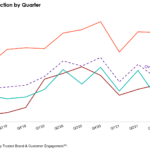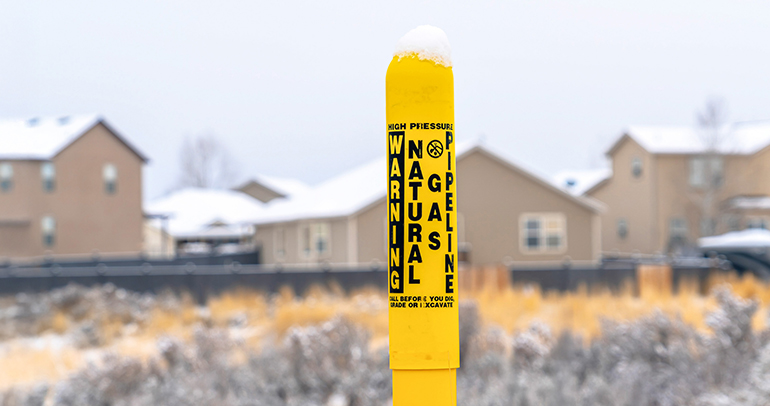
Customer Satisfaction Scores Declined in Q1’22, but It’s Okay. Why?
After record-breaking satisfaction scores across the utility industry during the pandemic—mostly due to shutoff moratoriums, helpful resources for low-income households, and a dash of gratitude for having power while at home 24/7—utilities are now dealing with the natural comedown from a (hopefully) once-in-a-lifetime customer experience.
This poses some questions.
- How do we explain these customer satisfaction declines to key stakeholders?
- How do we continue the growth seen in 2020 and most of 2021 in a more “normal” setting?
A one-quarter decline in satisfaction is not the same as a trended decline.
Our Utility Trusted Brand & Customer Engagement: Residential study found that customer satisfaction sharply improved in 2020, remained at or near its peak for the remainder of the year and then declined in the first and third quarters of 2021.
As a result of Cogent Syndicated tracking the industry each quarter, we can identify when the market starts shifting. Comparing Q4’21 to Q1’22, even though there was a decline, scoring is actually stable compared with the sharp movements seen in the past couple of years. This reflects more stability in the daily lives of utility customers. Despite the declines in 2021 and the past quarter, satisfaction ratings for multiple topic categories—such as satisfaction with the utility overall or with customer service—in the utility industry still remain well above pre-pandemic levels.
Utilities providing different types of energy service, like Combination (providing electric and natural gas service), Electric and Natural Gas, show more variance than what we see at an aggregate industry level.

Combination Utilities
Between Q4’21 and Q1’22, satisfaction with environment/energy management-related resources and product-related experiences—such as clearly explaining programs/offerings, making it easy to enroll or use them, or making offering information easily accessible—has significantly declined, particularly within the Midwest and West regions.
While customers increasingly use digital offerings, satisfaction ratings related to information clarity and accessibility show significant declines. Combination utilities can mitigate further declines in 2022 via improvements to online energy management tools, communicating the availability of proactive outage/emergency alerts and reducing the effort necessary to access online customer accounts.
When it comes to customer perceptions related to environmental dedication, satisfaction with these topics has significantly declined among combination utilities nationally. This is especially true for customer understanding of utility commitment to sustainable energy, encouraging green initiatives, protecting the environment, and consumption management tools. Given the importance of the environment to customers, one of the most top-of-mind causes overall, combination utilities should consider ramping up environmentally focused communication in the coming months.
Natural Gas Utilities
With rising gas prices and already strained wallets from the pandemic, natural gas customers are currently focused on paying their bills. Today, more customers feel they don’t have the means to pay their utility bills than at the height of the pandemic. This is especially true in the Midwest, South and West.
Utilities can help ease their customers’ economic anxieties by continuing to communicate energy management tips, encouraging consumption management program sign-up and proactively reaching out to customers who tend to have higher bills with payment options.
Ensuring customers have an easy time understanding and paying their bill can also improve perceptions. Natural Gas utilities, especially in the South, can help customers by improving the user experience of programs related to high bill notifications, budget billing and selection of payment due dates, which are the most frequently used with some of the lowest satisfaction ratings compared with other offerings.
Electric Utilities
Electric utility customers show the most improvement in customer service satisfaction at a national level. This is especially true among those using utility websites and interacting with utilities via mobile, both of which customers find easy to use in resolving their service issues.
Customer satisfaction has also significantly improved on topics related to helping the environment, raising customers’ energy consciousness and making program information easily accessible.
Although a satisfaction ratings downturn between Q4’21 and Q1’22 may reveal areas of improvement for individual companies, there’s no need for utilities to panic. Focus instead on long-term trends when communicating satisfaction changes to key stakeholders to ensure they understand the full picture.
Continue the satisfaction improvement seen in 2020 and much of 2021 by focusing on digital offerings and program accessibility, especially programs related to energy consumption management and billing and payment. Specifically targeting communication toward customers with high bills or COVID-19-driven arrearages is likely to aid satisfaction improvement, and communicating utility efforts to help the environment will further improve brand perceptions.
If you are interested in understanding how your utility’s brand stacks up against industry leaders and what they’re doing to achieve their leadership position, please reach out to me!









